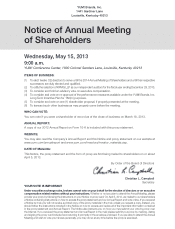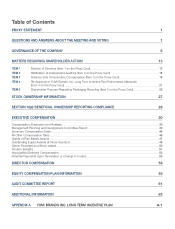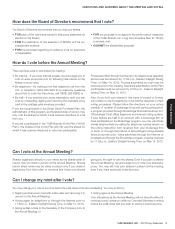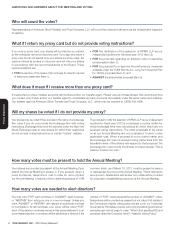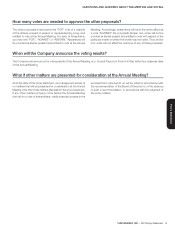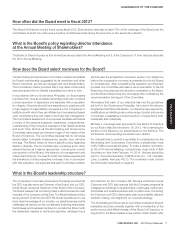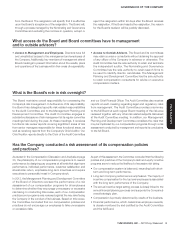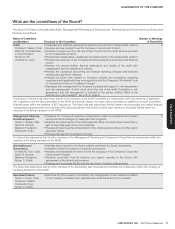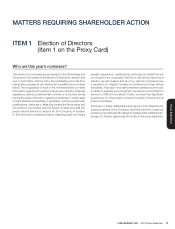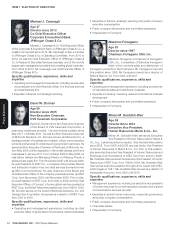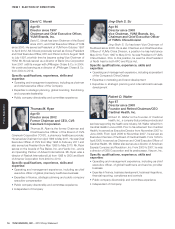Pizza Hut 2012 Annual Report Download - page 26
Download and view the complete annual report
Please find page 26 of the 2012 Pizza Hut annual report below. You can navigate through the pages in the report by either clicking on the pages listed below, or by using the keyword search tool below to find specific information within the annual report.
YUM! BRANDS, INC.-2013Proxy Statement8
Proxy Statement
GOVERNANCE OF THE COMPANY
its annual review which included engaging in dialogue and receiving
input from a number of major shareholders. The lead director
position is structured so that one independent Board member
is empowered with suffi cient authority to ensure independent
oversight of the Company and its management. The lead director
position has no term limit and is subject only to annual approval
by the independent members of the Board. Prior to August2012,
the Board had a presiding director role, which rotated annually
among the chair s of the independent committees of the Board.
Robert Walter served as the presiding director until August 2012
when t he Board’s independent directors appointed Thomas Ryan
to serve as the lead director, and have concluded that Mr.Ryan,
who also chairs the Nominating & Governance Committee, has
provided effective oversight in this role. In addition, to assure
effective independent oversight, the Board has adopted a number
of governance practices discussed below.
What are the Company’s g overnance p olicies and e thical g uidelines?
•
Board Committee Charters. The Audit, Management Planning
and Development and Nominating and Governance Committees
of the YUM Board of Directors operate pursuant to written
charters. These charters were approved by the Board of Directors
and refl ect certain best practices in corporate governance, as
well as comply with the Sarbanes-Oxley Act of 2002 and the
rules issued there under, including the requirements of the
NYSE. Each charter is available on the Company’s website at
www. yum. com/investors/governance/charters.asp.
•
Corporate Governance Principles. The Board of Directors
has documented its corporate governance guidelines in the
YUM!Brands,Inc. Corporate Governance Principles. These
guidelines as amended are available on the Company’s website
at www.yum.com/investors/governance/principles.asp.
•
Code of Ethics. YUM’s Worldwide Code of Conduct was
adopted to emphasize the Company’s commitment to the highest
standards of business conduct. The Code of Conduct also
sets forth information and procedures for employees to report
ethical or accounting concerns, misconduct or violations of the
Code in a confi dential manner. The Code of Conduct applies
to the Board of Directors and all employees of the Company,
including the principal executive offi cer, the principal fi nancial
offi cer and the principal accounting offi cer. Our directors and
the senior-most employees in the Company are required to
regularly complete a confl icts of interest questionnaire and
certify in writing that they have read and understand the Code
of Conduct. The Code of Conduct is available on the Company’s
website at www.yum.com/investors/governance/conduct.asp.
The Company intends to post amendments to or waivers from
its Code (to the extent applicable to the Board of Directors or
executive offi cers) on this website.
What other s ignifi cant Board p ractices does the Company have?
•
Private Executive Sessions. Our non-management directors meet
in executive session at each regular Board meeting. The executive
sessions are attended only by the non-management directors and
are presided over by the lead director. Our independent directors
meet in executive session at least once per year.
•
Role of Lead Director. Our corporate governance guidelines
require the election, by the independent directors, of a lead
director. The lead director position is structured so that one
independent Board member is empowered with suffi cient
authority to ensure independent oversight of the Company
and its management. The lead director position has no term
limit and is subject only to annual approval by the independent
members of the Board. Based upon the recommendation of
the Nominating and Governance Committee, the Board has
determined that the lead director is responsible for:
(a) Presiding at all executive sessions of the Board and any
other meeting of the Board at which the Chairman is
not present, and advising the Chairman and CEO of any
decisions reached or suggestions made at any executive
session,
(b)
Approving in advance agendas and schedules for Board
meetings and the information that is provided to directors,
(c) If requested by major shareholders, being available for
consultations and direct communication,
(d) Serving as a liaison between the Chairman and the
independent directors, and
(e) Calling special meetings of the independent directors.
•
Advance Materials. Information and data important to the
directors’ understanding of the business or matters to be
considered at a Board or Board Committee meeting are, to the
extent practical, distributed to the directors suffi ciently in advance
of the meeting to allow careful review prior to the meeting.
•
Board and Committees’ Evaluations. The Board has an
annual self-evaluation process that is led by the Nominating
and Governance Committee. This assessment focuses on the
Board’s contribution to the Company and emphasizes those
areas in which the Board believes a better contribution could
be made. In addition, the Audit, Management Planning and
Development and Nominating and Governance Committees
also each conduct similar annual self-evaluations.
•
Majority Voting Policy. Our Articles of Incorporation require
majority voting for the election of directors in uncontested
elections. This means that director nominees in an uncontested
election for directors must receive a number of votes “for” his
or her election in excess of the number of votes “against.” The
Company’s Corporate Governance Principles further provide that
any incumbent director who does not receive a majority of “for”
votes will promptly tender to the Board his or her resignation



